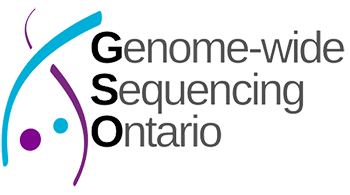1. Ontario Health Insurance Plan (OHIP) coverage
At this time, GSO is only accepting genome-wide sequencing (GWS) requests for Ontario patients insured under OHIP. Testing for non-Ontario patients is not available. For uninsured patients who meet the clinical eligibility criteria, please contact the catchment laboratory assigned to your institution to discuss options for testing. Ontario patients who have coverage under the Interim Federal Health Program (IFHP) and are pre-approved for whole exome sequencing (WES) may also be submitted to GSO for testing.
2. Routine vs. Expedited
GSO is currently funded to provide testing on routine turnaround times only. Applications for whole exome sequencing (WES) ordered for other indications should continue to be submitted to the Ministry of Health’s Out-of-Country/Out-of-Province (OOC/OOP) Prior Approval Program for Laboratory testing. Examples of such indications include:
- Fetal cases in an ongoing pregnancy
- Medically urgent cases for which expedited results (<4 weeks) are required and expected to immediately alter management.
3. Postnatal vs. Fetal cases
GSO is not currently funded to provide testing on fetal cases. Cases submitted on fetal samples (defined as <36 weeks of gestation) should be submitted to the Ministry of Health’s Out-of-Country/Out-of-Province (OOC/OOP) Prior Approval Program for Laboratory testing. This includes fetal cases from an ongoing pregnancy, and fetal demise/stillbirths.
4. Clinical eligibility
Patients must meet the clinical GWS eligibility criteria as defined by the Ontario Ministry of Health. Note that the criteria may evolve as more data are generated and should be considered provisional at this time.
Clinical Presentation (must meet ≥ 2 items):
- Moderate to severe developmental or functional impairment
- Multisystem involvement
- Progressive clinical course
- Differential diagnosis includes ≥ 2 well defined conditions requiring evaluation by multiple targeted gene panels
- Suspected severe genetic syndrome NYD for which multiple family members are also affected, or where parents are consanguineous
Management Impact (must meet ≥ 1 item):
- Will limit further invasive diagnostic investigations
- Results allow for specific and informed reproductive decision making (for patient or parents)
- Will enable identification of at-risk family members and facilitate early intervention
Common reasons for ineligibility include:
- The patient has a molecular diagnosis which explains the phenotype
- The patient has had previous comprehensive panel testing completed in the last 3 years where the panel contained virtually all known genes for the patient’s clinical indication
- The patient has previously undergone clinical whole exome sequencing
- The patient has
- Isolated mild intellectual disability or learning disabilities; or
- Isolated non‐syndromic autism; or
- Isolated neurobehavioural disabilities (e.g., attention deficit disorder); or
- A phenotype highly specific to a known genetic condition for which an optimized genetic panel exists, or for which all known gene‐disease associations could be assessed. If so, then the targeted gene panel should be given priority assuming it is more sensitive (e.g., Noonan spectrum disorders)
- A clinical presentation which is explained by other causative circumstances (e.g., environmental exposures, injury, and infection) based on the most complete clinical history
For the eligibility criteria, please review page 2 of the test requisition.
Check our Frequently Asked Questions page.

